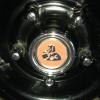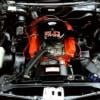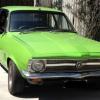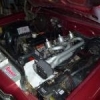
#76

Posted 19 November 2014 - 04:48 PM
Today I've had all sorts of advice as to what is wrong.
All from brake specialists in Perth and over east.
Here's the stuff I've been told which I think is wrong.
Rear cylinders should go bigger, not smaller when converting from drum car. So I'd be looking at bigger than 21mm
The valving holes in a drum master are different from disk and can't be modified.
So I don't know who to trust and what to do.
Let's try one question at a time.
That little rubber valve in master, shouldn't that prevent the pistons from returning to in position? If so, why can I hold pistons with fingers, push pedal, pistons come out, let go of pedal, piston push back in.
Very close to pushing car into the naughty corner for a while.
Marty
#77

Posted 19 November 2014 - 04:53 PM
Do you have a mate with the same brake setup, so you can try your master, wheel cyls etc on there car.
Desperate times desperate measures.
Cheers Brian
#78

Posted 19 November 2014 - 05:26 PM
Rear cylinders should go bigger, not smaller when converting from drum car. So I'd be looking at bigger than 21mm. NO. Neil has supplied you with the correct size wheel cylinders to suit an LJ with disc front brakes.
The valving holes in a drum master are different from disk and can't be modified. Never heard that one before. The only difference between a disc/drum and a drum/drum LJ m/cyl is the residual line pressure valve is required with front drums and not with front disc.
Anyway in either case you are still running drum rears so nothing has been modified in the m/cyl for the rear brakes.
Edited by S pack, 19 November 2014 - 05:27 PM.
#79

Posted 19 November 2014 - 05:46 PM
Bit of a stab in dark here but sounds like the system want's to work but won't..whats with the proportioning valve?
#80

Posted 19 November 2014 - 05:48 PM
That little rubber valve in master, shouldn't that prevent the pistons from returning to in position? Yes. The residual pressure valve should hold approx 4psi pressure in the brake lines and subsequently in the wheel cylinders.
If so, why can I hold pistons with fingers, push pedal, pistons come out, let go of pedal, piston push back in. Sounds like your residual pressure valve is faulty unless your fingers are exerting more than 4 psi of pressure on the wheel cylinder pistons. Too much NutriGrain maybe???
Bit of a stab in dark here but sounds like the system want's to work but won't..whats with the proportioning valve?
What proportioning valve? LJ's don't have one.
#81

Posted 19 November 2014 - 05:58 PM
Post #1 says proportion valve has been re-sealed?
#82

Posted 19 November 2014 - 06:54 PM
Post #1 says proportion valve has been re-sealed?
Just wrong terminology, brake warning unit has been dismantled, cleaned, new o rings fitted.
So if the rubber valve only holds 4 psi I would expect the shoe springs to pull that back????
#83

Posted 19 November 2014 - 07:02 PM
Its a residual valve to hold fluid pressure in the line to sort of counteract the spring pressure on the shoes
No valve and the springs will pull the shoes straight back when released.
I think there's a slow leak at the rear of master since the guy rebuilt it.
I'm going to have to take it back for fixing. Should I take off and check brake warning thingy too?
#84

Posted 19 November 2014 - 07:11 PM
#85

Posted 19 November 2014 - 08:39 PM
#86

Posted 19 November 2014 - 11:28 PM
So if the rubber valve only holds 4 psi I would expect the shoe springs to pull that back????
Yes, the pressure exerted by the brake shoe return springs is more than enough to unseat the residual line pressure valve allowing fluid to flow back into the master cylinder.
When the pressure in the brake pipes drops to 4psi the valve will seat and 4psi of pressure will be maintained in the brake pipes and wheel cylinders.
Basically the wheel cylinder pistons will maintain contact with the brake shoes.
As you can see in the pic of my rear brakes the wheel cyl pistons are not in contact with the brake shoes because at the time the pic was taken the wheel cylinders had not been bled.

#87

Posted 19 November 2014 - 11:45 PM
Definitely sounds like a blockage/obstruction/leak or air somewhere.
Don't give up mate, there are only so many things that can go wrong.
If you pump the brakes do the slave pistons come out a bit more?
You should be able to build up pressure if it is air in the line.
What if you take that valve out of the master cylinder and try without it?
In theory the pistons should then come out all the way, but then snap back quickly as soon as you release the brake.
That will tell you if it is the valve.
I solve problems that other people have already tried to fix for a living.
What I would do is make a list of all the things you can think of that it could be, rank from the most likely to the least likely, then start at the top and work out a way to test each possibility.
Some of these things you would have tested already, but some you wouldn't have.
After a while you will eliminate enough possibilities to get a clearer picture.
I wish I could help more than that mate, but that's the best I can do.
Good luck, you deserve to have better luck than this right now.
#88

Posted 21 November 2014 - 09:26 AM
How important is bench bleeding? I didn't do this. Could I have air in the master?
Marty
#89

Posted 21 November 2014 - 04:31 PM
I've heard that repeatedly pumping the pedal forces any air towards the calipers/wheel cylinders for easier bleeding of said air. Seems you're running out of options... can't be that hard can it? I know I had prolonged issues bleeding the wifes VN Calais, seemed to be chasing me tail. Thats when I tried the old 'bleed hose in old fluid to prevent drawback' trick.
#90

Posted 21 November 2014 - 04:43 PM
My method of brake bleeding is usually,
Start off with the one man brake bleeding kit (only cause I dont have any friends) and start at the rear wheel furthest from the M/C. Once Ive given each wheel a decent bleed, Ill harass my daddy to come round and help, I get him to give the pedal 5-10 good pumps then hold the pedal to the floor, once again I start on the wheel furthest from the M/C, I crack the bleeder whilst he keeps his foot down, let the fluid out, then tighten up bleeder then repeat. Usually 3 times per wheel.
On my red car Ive got a pressure bias valve, so usually the one man kit is the ideal way or just go easy on the pumping when doing the rear wheels... otherwise you get no fluid out.
May not be the ideal way? But seems to work for me.
#91

Posted 21 November 2014 - 04:50 PM
I have no friends either. Kids can't be bothered doing anything without buttons, and mrs has no idea what I'm talkin about (unusual?).
Mind you, 'if ya want anything done properly... ya gotta do it yerself!'
#92

Posted 21 November 2014 - 06:13 PM
So how important is bench bleeding and why is it done?
#93

Posted 21 November 2014 - 06:46 PM
Put drums on..sticky tape a block of wood to underside of brake pedal to prevent over travel...."sweet talk" Mrs or kids by saying 'this is a very important job" while staggering to car port with a carton.
Try to explain that the beers are cold and nice and after a sixpack explain the technical qualities needed to carry out such a job after the odd word or 2.
when things settle down say sorry and that the help is most important...breathe on Mrs with intoxicating fumes..this will mellow things out
a bit.
Find some tools that you were using but can't find now.
Explain that you say will "pump & hold"...at the "hold" command crack the bleed nipple that has a piece of tube running into an empty tin/bottle, do not under any circumstances mistake the tin/bottle for the one on the bench.
When the bleed nipple has been nipped up say pump and hold again and repeat...it may take a while but works.
![]()
#94

Posted 21 November 2014 - 07:10 PM
I didn't bench bleed mine when done recently.
Could the booster push rod be to short to activate the rear brakes enough to fully engage them?
Does the pedal go to the floor?
How hard is the pedal?
#95

Posted 21 November 2014 - 08:53 PM
Bench bleeding is not not going to make the difference in your situation.
I'm still thinking about your wheel cyls, and can you get your hands on another master.
Cheers Brian
#96

Posted 21 November 2014 - 10:45 PM
Too busy at the moment to try anything yet but it's all going into the memory banks.
Ok bench bleeding is not the problem.
Master is said to be good.
Can someone with hydrolic knowledge explain how the big bore cylinders seem to do the job.
I would have thought they need more fluid to fill them to push out and they hold really well.
So if the master is pumping more fluid and holding, why won't a small cylinder move and hold?
Cheers
Marty
Ps. I can get another master to try if need be, it'll just take time.
#97

Posted 21 November 2014 - 11:23 PM
Found the following on fbekholden.com
We need perhaps to look at master cylinder vs wheel cylinder. It's the "ratio" which does the work.
A 1" master cylinder acting on a 3/4" wheel cylinder will exert more "work" to the shoes - than the same 1" master cylinder acting on a 9/16" disc compatible wheel cylinder.
Initially, we believe the opposite - as in what most conceive is a greater volume - but this is not the case - it's the "leverage". I can only suggest that if the same 1" master cylinder was acting on a 2" slave cylinder - the power transmitted would be exceptional - but the brake pedal would almost go to the floor to achieve it.......we must remember, force not volume.......
If we were to use the standard front drum brake compatible rear wheel cylinders when setting up a disc front end - the rear brakes would almost lock up on each application. To add a power booster to this would make it very difficult to avoid as there is precious little pedal travel when using the hydraulic servo-boosted system.
#98

Posted 21 November 2014 - 11:33 PM
I had to have a valve removed from my master cylinder to make my brakes work properly when I put a disk brake front end in my old LC.
I assume it is the one talked about previously.
#99

Posted 21 November 2014 - 11:50 PM
Found this comment on Fastlane.
You have to change the rear wheel cylinders because disc brakes take more pressure to work effectively than drums. Holden reduced the size of the rear wheel cylinder bores to help prevent rear wheel lockups. From memeory the smaller bore wheel cylinders were visibly different on the outside so you have to use the matching pair of shoes for the wheel cylinder.
#100

Posted 22 November 2014 - 08:16 AM
Been thinking about the aforementioned info I posted last night.
In the absence of finding a definitive problem there is probably nothing wrong with your rear brakes. You are possibly expecting more from them than what they are designed to give.
Have you tested the rear brakes with vacuum assistance?
1 user(s) are reading this topic
0 members, 1 guests, 0 anonymous users



















